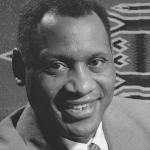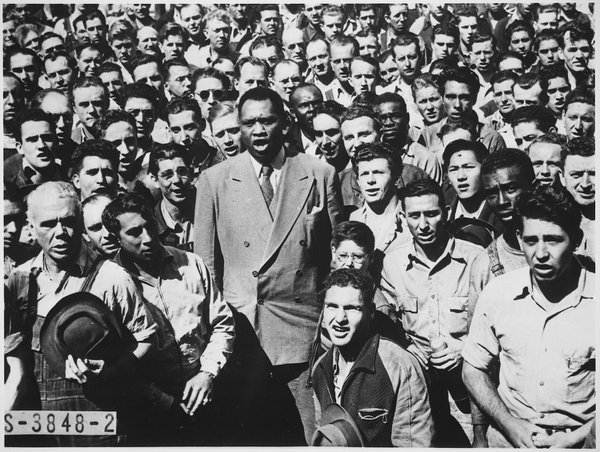Remembering Paul Robeson: ‘I Had No Alternative’

On June 12, 1956, Paul Robeson testified defiantly before the U.S. House Un-American Activities Committee (HUAC). His exchange with Congressman Gordon Scherer of Ohio is a fitting preface to commemorating the 125th anniversary of the birth of America’s quintessential genius on April 9:
Scherer: Why do you not stay in Russia?
Robeson: Because my father was a slave, and my people died to build this country, and I’m going to stay here and have a part of it just like you. And no fascist-minded people will drive me from it. Is that clear?
That testimony reflected Paul Robeson’s lifelong commitment to resistance and antifascist politics. His career of athletic excellence in football, basketball, baseball, and track; his brilliant artistic accomplishments in film, theater, and singing; his remarkable facility in foreign languages; and his highly public efforts supporting the rights and struggles of labor, African Americans, Jews, and socialist groups in America and throughout the world have been documented thoroughly in books and articles, including frequently in the pages of The Progressive.
Despite this well-earned acclaim, Paul Robeson has once again seemingly faded into the obscurity that followed his blacklisting during the dark days of McCarthyism in the 1950s. I can attest to this sad reality anecdotally in my own experience as a teacher. Just recently, in my honors art history course at UCLA, I projected a portrait of Robeson to my class of about forty students. Not one had recognized who he was and even when I identified him, it made no difference at all. Even in my larger UCLA classes of more than 100 students, usually only two or three students at most recognize the activist.
Perhaps this is to be expected. Most of my students were not yet born when Robeson received widespread media attention for his centenary in 1998. They were only toddlers in 2004, when the U.S. Postal Service issued a Paul Robeson postage stamp after considerable public pressure.
Still, Robeson’s 1956 statements about “fascist-minded people” in the United States were eerily and tragically prescient, making it all the more compelling to resurrect his memory yet again 125 years after his birth. As we celebrate his life, we should pay close attention to his courageous response to the reactionary badgering of Congressman Scherer. We see frightening contemporary developments throughout the United States of fascist incursions into American political and social life. The most egregious and publicly visible have emerged in Florida, as Republican Governor Ron DeSantis attempts to model the state on some personal version of fascism that is profoundly dangerous to democracy itself—including the vague and ominously named Stop WOKE Act and the blocking of an African American studies course.
But DeSantis is merely the most visible contemporary proponent of an American neo-fascism. Other governors like Glenn Youngkin of Virginia and Sarah Huckabee Sanders of Arkansas have also promoted fascistic policies in their states. Local leaders in several other states have done the same. Book removals and censorship are rampant, including well-known classics as well as contemporary works addressing issues of race, gender, and sexual identity. Revealingly, banned Black authors and public figures have been notable targets, including many historical icons and anti-racist writers, scholars, and key representatives of Critical Race Theory, among all too many others. Many of the activities of rightwingers today follow the examples of Hungarian neo-fascist leader Viktor Orbán and other demagogues throughout the world who abhor democracy and free expression.
All of this is reminiscent of the blacklisting and censorship of McCarthyism during the 1950s in America, of which Paul Robeson was one of many victims. In these times, Robeson’s fervent antifascist vision and multifaceted record as an artist should also be resurrected. People of all ages can see him as a beacon of hope and inspiration, but young persons of color, who all too frequently are told directly or indirectly that they are incapable of achievement, can especially look to Paul Robeson as one of the most powerful role models they can ever have. Even though they rarely encounter this magnificent record in school, they should listen to his beautiful voice as he sings Black spirituals, folk songs of many nations and cultures in many languages, labor and protest songs, and excerpts from classical music. They should also see many of his trailblazing films from the early twentieth century, perhaps most valuably Song of Freedom and The Proud Valley. And, if possible, they should listen to the recording of his New York performance of Shakespeare’s Othello—which broke ground by featuring a multiracial cast. Unfortunately, his magnificent performance in that classic tragedy was never filmed.
Paul Robeson’s antifascist activism long preceded and later coincided with his artistic life. As Lindsey Swindall, Gerald Horne, and other scholars have powerfully documented, Robeson sought full freedom for oppressed people throughout the world, including for Black people in the United States.

Paul Robeson starring in Showboat 1933.
Photographer unknown -U.S. National Archives and Records Administration, Public Domain
By 1937, Robeson’s antifascist vision coalesced around the Civil War in Spain, pitting democratic forces against the fascist rebellion of General Francisco Franco. Even in a losing cause, Robeson supported the historic International Brigades, especially the American volunteers of the Abraham Lincoln Brigade.
Later, he held concerts, spoke at large rallies, campaigned for the reelection of President Franklin Roosevelt in 1944, and generally raised awareness of the antisemitism and racism of the Axis powers. Following the war, Robeson continued his antifascist struggles by fighting against racial violence and lynching of African Americans, including Black veterans who faced overt segregation, violence, and even extrajudicial murder. His increasingly unpopular stances caused him to be called before the California Un-American Activities Committee and to be blacklisted due to the growing anti-communist hysteria in the country. That persecution lasted the remainder of his life, perhaps contributing to his general disappearance from current public discourse.
The words inscribed at his gravesite in New York are perhaps the most fitting testament to Robeson’s life: “The artist must elect to fight for freedom or slavery. I have made my choice. I had no alternative.”
Paul Robeson starring in Showboat 1933
Author, Paul Von Blum, is senior lecturer in African American Studies and Communication at UCLA. He is a longtime civil rights and political activist and the author of many books and articles on political art, expressive culture, education, and law.
